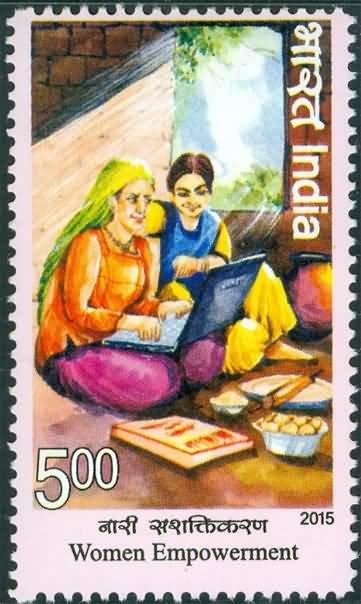Women Empowerment

Technical Data
| Date of Issue | September 2, 2015 |
|---|---|
| Denomination | Rs. 5 |
| Quantity | 500,000 |
| Perforation | 13½ x 13 |
| Printer | Security Printing Press, Hyderabad |
| Printing Process | Wet Offset |
| Watermark | No Watermark |
| Colors | Multicolor |
| Credit (Designed By) | Mr. Suresh Kumar Smt. Alka Sharma |
| Catalog Codes |
Michel IN 2880A Stamp Number IN 2735 Yvert et Tellier IN 2627 Stanley Gibbons IN 3055 |
| Themes | Books | Computers | Women |
Advancing Equality, Dignity and Inclusive Development
Empowering women to participate fully in economic, social, and political life is fundamental for building stronger economies, achieving sustainable development, and improving the quality of life for individuals and communities. The United Nations Development Programme (UNDP) identifies gender equality and women’s empowerment not only as a matter of human rights, but also as essential pathways to achieving global development goals, including the Millennium Development Goals and the broader agenda of sustainable development.
Constitutional Commitment to Gender Equality
The principle of gender equality is deeply embedded in the Constitution of India—in the Preamble, Fundamental Rights, Fundamental Duties, and Directive Principles of State Policy. The Constitution not only guarantees equality to women but also empowers the State to adopt affirmative measures to uplift and protect them.
Over the decades, India has framed laws, policies, and development programmes aimed at advancing women’s rights and ensuring their meaningful participation across sectors. A major milestone in this direction was the establishment of the National Commission for Women (NCW) in 1992, created by an Act of Parliament to safeguard women’s constitutional and legal rights.
The 73rd and 74th Constitutional Amendments (1993) further strengthened women’s empowerment by reserving seats for women in Panchayats and Municipalities, enabling their increased participation in grassroots governance.
Challenges and Persistent Gender Gaps
Despite strong legal frameworks and widespread grassroots efforts, substantial gaps continue to exist between constitutional ideals and the lived realities of women in India. Gender disparity is still evident in various forms:
- Declining female sex ratio
- Social stereotyping and discriminatory norms
- Domestic and societal violence
- Persistent discrimination against girls and women
Women, particularly those from marginalized communities—Scheduled Castes, Scheduled Tribes, Other Backward Classes, minorities, and those in rural or unorganized sectors—continue to face limited access to education, healthcare, and productive resources. Patriarchal property rights and socio-economic structures have further contributed to their subordinate status.
Ensuring Participation and Decision-Making Power
Women’s equality in power sharing and decision making is essential for achieving true empowerment. Efforts are required to ensure women’s representation at all levels—
legislative, executive, judicial, corporate, statutory bodies, commissions, committees, and advisory boards.
Women-friendly workplace policies and support systems encourage greater participation in national development processes.
Education and Skill Development: A Priority
Equal access to education remains a cornerstone of empowerment. Comprehensive measures are required to:
- Eliminate discrimination against girls
- Achieve universal education
- Reduce dropout rates
- Improve educational quality
- Promote lifelong learning
- Enhance vocational, technical, and professional skill development
Holistic Approach to Women’s Health
Women’s health needs attention at every stage of life, covering nutrition, preventive care, and access to medical services. Reducing infant mortality and maternal mortality, both sensitive indicators of human development, remains a national priority.
Beti Bachao Beti Padhao: A National Mission
Recognizing the urgent need to address gender imbalance and safeguard the rights of the girl child, the Government of India launched the Beti Bachao Beti Padhao (BBBP) initiative. Implemented through a national campaign across selected districts with low Child Sex Ratio, this joint initiative of the Ministry of Women and Child Development, Ministry of Health and Family Welfare, and Ministry of Human Resource Development aims to:
- Prevent gender-biased sex-selective elimination
- Ensure survival and protection of the girl child
- Promote education and participation of girls
Creating a Gender-Sensitive Society
To close gender gaps and shape a more inclusive society, coordinated and convergent efforts are essential. Strengthened institutional mechanisms, legislative support, and effective resource management must work in tandem.
Gender sensitization remains a key component. Mass media, in particular, plays a powerful role and must be encouraged to remove gender stereotypes and promote positive, empowering narratives.

Leave a Comment
You must be logged in to post a comment.